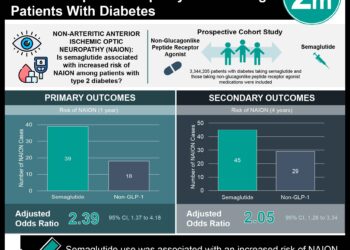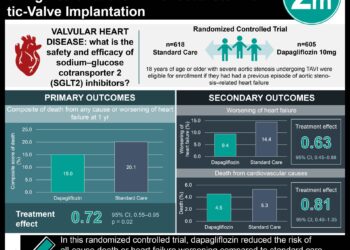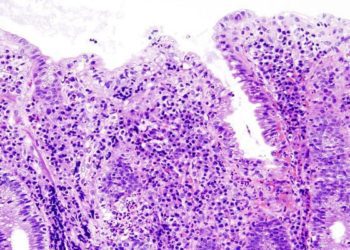Intermittent and continuous antiretroviral therapies are equivalent in the treatment of acute HIV-1 infection
Image: PD/CDC
Key study points:
- Patients diagnosed with acute HIV-1 benefited equally from continuous ART, intermittent ART, and intermittent ART combined with interferon-alpha, with no statistically significant differences in HIV-RNA levels and CD4-cell counts.
Primer: Acute or primary HIV is a very early stage of infection, characterized as the window between infection and development of any antibodies, and experienced by patients as a mononucleosis-like illness.
The evidence on timing of initiation of ART is mixed. The strongest evidence exists for initiation of ART for CD4 counts below 500. Initiation of treatment at higher CD4 counts has heterogeneous evidence. Despite poor understanding of a proven mortality benefit, early treatment is cautiously advocated by the Department of Health and Human Services based on emerging evidence that untreated HIV infection increases risks for many non-AIDS-defining diseases.
The possible benefits of treating acute HIV are that it may preserve HIV-specific aspects of cellular immune function and establish a lower viral load set point, limit viral evolution of drug resistance and decrease the risk of morbidity. The risks of such an early treatment approach include a higher risk of long-term drug toxicities, and evolution of drug resistance in the event of treatment failure.
Of note, interferon-alpha (IFN) directly inhibits several stages of HIV replication, and is a candidate for adjunct therapy with ART as it possesses both antiviral and immunostimulatory properties.
Perhaps in light of the controversial indication, there have been no randomized studies comparing acute HIV treatment strategies to date. This study compared three approaches to treating acute HIV: continuous ART (cART), interrupted ART (ART-STI), and interrupted ART with IFN (ART-STI-IFN).
Background reading:
This [randomized, controlled] study by Goujard et. al., named the INTERPRIM trial, examined the efficacy of treating patients with acute HIV, defined as detectable HIV-RNA and negative or intermediate Western-blot, using 3 different therapeutic regimens: cART, ART-STI, and ART-STI-IFN.
The study analyzed a total of 89 patients, of which 30 were allocated to cART, 30 were allocated to ART-STI and 29 were allocated to ART-STI-IFN. All treatments lasted for a total of 72 weeks.
cART patients were treated continuously with ART left up to the investigators discretion. ART-STI patients received standard ART for 36 weeks, followed by 3 4-week interruptions of therapy at weeks 36, 48, and 60. ART-STI-IFN patients received the same ART schedule as ART-STI patients, but additionally received IFN during the first 14 weeks of treatment and during each ART interruption. All patients were then monitored for a total of 96 weeks.
With intent to treat analysis, all treatment strategies faired similarly. HIV-RNA rapidly declined initially in all regimens. Viral load rebounds were observed in both STI regimens, with the rebound levels being significantly lower in the STI-IFN group. However, there was no statistical difference in median HIV-RNA levels 6 months after last interruption among all treatment groups. CD4 count was higher in the cART group compared to the STI groups during treatment, but showed no difference at the completion of treatment at week 96. The groups showed no difference in CD4 T-lymphocyte function throughout any part of treatment. Adverse effects were similar among groups, with more neuropsychiatric effects occurring in the STI-IFN group.
In sum: There was no statistical difference in viral load set-point between interrupted and continuous ART at the end of this first randomized trial for acute HIV treatment.
Though appropriately powered to 80% with 30 patients per arm at the initial enrollment of the study, the final analysis only included 29 patients in the ART-STI-IFN arm. This was a small trial. A larger, more greatly powered study may have shown significant difference in trial arms. Additionally, the role of interferon as adjunctive treatment to ART was not fully examined in this study, as it was only given during periods of active viral replication.
Further trials will be required to establish optimal treatment regimens for acute HIV and also to examine the role of interferon as an adjunctive therapy to ART.
Click to read the study in [AIDS]
By [AS] and [MP]
© 2012 2minutemedicine.com. All rights reserved. No works may be reproduced without written consent from 2minutemedicine.com. DISCLAIMER: Posts are not medical advice and are not intended as such. Please see a healthcare professional if you seek medical advice.




